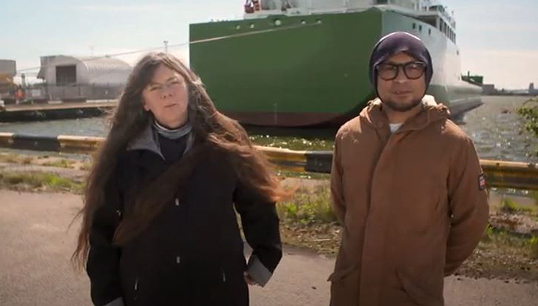
Seafarers of different faiths and no faith rely on support from port chaplains in coping with what is often dangerous work in challenging institutionalised workplace settings, research from Cardiff University has found.
Onboard ship, religious beliefs and attitudes are kept private but seafarers revealed to the team the ways in which many who do have a faith construct their own set of religious beliefs in order to cope better with living and working conditions.
The study, led by the Seafarers International Research Centre (SIRC) and funded by the Economic and Social Research Council (ESRC) as part of UK Research and Innovation (UKRI), investigated the faiths and welfare of seafarers onboard two cargo vessels carrying multinational crews.
The research also showed the important role, particularly during the pandemic, of port chaplains, paid staff and volunteers – all of which provide welfare services to seafarers of all faiths in dedicated seafarers' centres.
Professor Helen Sampson, director of the Seafarers International Research Centre (SIRC) at Cardiff University said: 'Seafaring is an extremely dangerous occupation and we found seafarers had experience of feeling very afraid onboard a ship at some point in their career. When they'd felt particularly helpless, many had turned to their gods for assistance.'
The research findings are described in a new film which shines a light on how seafarers express and draw upon faith and the support of port chaplains in dealing with the stress of being away from home for months at a time isolated from their communities and networks. The film brings together the reflections of the research team with those of key stakeholders.
Andrew Linington, a senior policy advisor at Nautilus International UK, who was interviewed for the film, said: 'This research is critically important because it comes at something like a watershed moment for seafarer welfare.
'Over the last few years, we've seen a much greater awareness of psychological needs as the industry has changed dramatically and the complexity of needs along with it.
'By tapping into those changes, highlighting the need for a restructuring of services and for a reappraisal of what seafarers need by asking the questions of the seafarers themselves, then we have the basis for what could deliver a quantum shift in seafarer welfare.'
Tags
More articles
Seafarers to be remembered on Sea Sunday
Merchant Navy crew are being commemorated in a special Sailors' Society video message created for Sea Sunday, which is marked by churches around the world every year.
Shipping industry sustains Mission to Seafarers crew welfare campaign
An ongoing crew welfare campaign by The Mission to Seafarers has raised £320,000 from donors across the shipping industry.
Register for the Sea to City Networking Event
Nautilus International and Maritime London have created the Sea to City project, a networking and mentoring scheme aiming to encourage seafarers looking to move ashore to consider maritime services positions.
